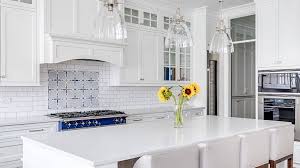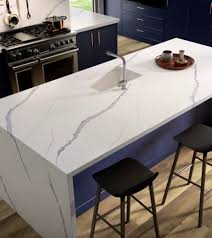Quartz and granite are two popular choices for countertops trends in countertops in kitchens and bathrooms. When it comes to deciding between these two options, there are several factors to consider. Both materials have their own unique properties and benefits, making the decision a matter of personal preference and practicality. In this article, we will explore the differences between quartz and granite countertops to help you make an informed decision for your space.
Quartz countertops are made from engineered stone, which is a mix of natural quartz and resins. They are low-maintenance, resistant to stains and scratches, and come in a variety of colors and patterns. Granite countertops, on the other hand, are natural stone and offer a unique, one-of-a-kind look with natural variations in color best countertop materials for kitchen and pattern. They are heat and scratch-resistant, but require regular sealing to prevent stains. When choosing between quartz and granite, consider factors such as your budget, maintenance preferences, and desired aesthetic.
Comparing the Durability of Quartz and Granite Countertops

When it comes to what is the best countertop material choosing the right material for your kitchen countertops, quartz and granite are two popular options to consider. Quartz countertops are engineered using a blend of stone and resin, making them non-porous and resistant to staining. On the other hand, granite countertops are natural and offer unique patterns and colors. While quartz tends to provide a more consistent appearance, granite features natural variations due to its composition. Both materials are durable and can withstand the wear and tear of daily use, but it's essential to consider factors such as cost, maintenance, and aesthetic preferences when making a decision between quartz and granite countertops for your kitchen.
Quartz countertops are engineered by combining natural quartz with resin and pigments, making them highly durable and resistant to staining and scratching. They are also non-porous, reducing the risk of bacteria growth. On the other hand, granite countertops are natural stones that are also very durable and heat-resistant. However, they can be more prone to staining and require regular sealing to maintain their durability. Overall, both quartz and granite countertops are strong and long-lasting options for kitchen and bathroom surfaces.
Understanding the Cost Differences Between Quartz and Granite

Quartz and granite are both popular choices for kitchen and bathroom countertops, but they have significant cost differences. Quartz is typically more expensive than granite, as it is an engineered stone made from a blend of natural quartz and resin. Granite, on the other hand, is a natural stone that is quarried and then cut into slabs for use in countertops. The cost of quartz can be higher due to the manufacturing process, as well as the wide range of colors and patterns available. Granite tends to have more variation in its appearance, which can also impact the pricing. Ultimately, the cost difference between quartz and granite will depend on factors such as the quality of the stone, the amount needed for the project, and the complexity of installation.
The Environmental Impact of Quartz vs. Granite in Countertops

Quartz countertops tend to have less of an environmental impact compared to granite countertops. Granite is a natural stone that must be quarried, resulting in the destruction of natural habitats and the emission of carbon dioxide and other pollutants. In addition, the transportation of granite from quarries to fabrication facilities and then to the final installation location further contributes to its environmental impact. Quartz, on the other hand, is an engineered stone made mostly of natural quartz mixed with resins and pigments. It is often produced using waste by-products from other quarried materials, reducing the environmental impact of mining. Furthermore, some manufacturers utilize sustainable practices and recycled materials in the production of quartz countertops. While there are still environmental considerations to take into account when it comes to the resins used in quartz countertops, overall, they have a lower impact on the environment compared to granite.
Choosing Between Quartz and Granite for Your Kitchen Renovation
When it comes to choosing between quartz and granite for your kitchen renovation, there are a few key factors to consider. First, both materials are durable and highly resistant to scratches, heat, and stains. However, quartz is non-porous and does not require sealing, making it easier to maintain than granite. Quartz also offers a wider range of colors and patterns, as it is an engineered stone. Granite, on the other hand, is a natural stone and each slab is unique in its appearance and veining. In terms of cost, quartz tends to be more expensive than granite, as it is a man-made product. However, granite requires regular sealing to maintain its stain resistance, which can add to the overall cost over time. Ultimately, the decision between quartz and granite will depend on your personal preference, budget, and maintenance preferences. Both materials can enhance the beauty and functionality of your kitchen, so it's important to weigh the pros and cons before making a decision.
Exploring the Different Aesthetics of Quartz and Granite Countertops
Exploring the different aesthetics of quartz and granite countertops involves considering factors like color, pattern, texture, and overall appearance. Quartz countertops are engineered to mimic the look of natural stone and come in a wide range of colors and patterns. They are non-porous, making them resistant to staining and bacteria growth. Granite countertops, on the other hand, are a natural stone with unique patterns and variations. They are known for their durability and heat resistance. When comparing the two, it's important to consider the aesthetic qualities that best fit your personal style and the overall design of your space.
Maintaining and Cleaning Quartz and Granite Countertops
Maintaining and cleaning quartz and granite countertops requires regular care and attention. To maintain the sheen of quartz countertops, it is important to wipe spills and stains immediately with a gentle cleaner and a soft cloth. Avoid using abrasive cleaners or harsh chemicals, as these can damage the surface. Additionally, be cautious when placing hot pots or pans directly on quartz countertops, as extreme heat can cause discoloration or cracking. For granite countertops, it is recommended to seal the surface regularly to protect against stains and bacteria. Use a granite-specific cleaner or mild dish soap to clean the surface, and avoid using acidic or abrasive cleaners that can dull the finish. Wipe spills promptly to prevent staining, and use trivets or hot pads to protect the surface from heat damage. In general, both quartz and granite countertops benefit from regular cleaning with a mild, pH-balanced cleaner and a soft cloth. It is important to follow the manufacturer's specific care instructions for each type of countertop to ensure long-lasting beauty and durability.
In conclusion, when choosing between quartz and granite for your countertops, consider factors such as durability, maintenance, and aesthetic appeal. Quartz offers low maintenance and a wide variety of colors and patterns, while granite provides a timeless, natural beauty and exceptional heat resistance. Ultimately, the decision between quartz and granite comes down to your personal preferences and priorities. Both quartz & granite are excellent options for a stunning and functional countertop in your home.
best material for countertops
